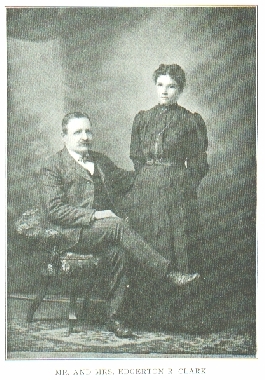
Edgerton Ryerson Clark
Among
the well remembered residents of Sacramento was Edgerton R. Clark who was greatly esteemed by all who
knew him because of his sterling character, business ability and amiable
disposition. He led an industrious life, was regarded as possessing unusual
mechanical and constructive ability and met with very gratifying success in his
affairs. He was born on the 17th of October, 1857, in Canada, and
was the youngest of the fourteen children of Russell and Marie Jane (Ryerson)
Clark. His father, who was the first white child born in Buffalo, New York, was
an engineer and an expert mechanic, and his son inherited his talents to the full
in that direction. The Clark family had been represented in New York state for
many generations, and the Ryerson family has long been established in New York,
New Jersey and New Hampshire. The Ryerson family history, now in the possession
of Mrs. Clark, contains the record of many very splendid characters. After the
war of the revolution, two brothers of that name settled in Canada and two in
the United States. Edgerton R. Clark’s
maternal grandfather, George Sterling Ryerson, was born in Mangerville, New
Brunswick, March 7, 1791, and in 1798 went with his father and the family to
Upper Canada, where he endured the hardships of real pioneer life. After the
War of 1812-14, in which he took part on the Canadian side, he was ordained a
minister of the Methodist Church and became a missionary to the Indians. The
Ryerson family story is closely linked with the history of Canada and the
border states of the United States during that period.
Edgerton
R. Clark received his educational training in the public schools in Tawas City,
Saginaw and St. Charles, Michigan, in which localities the family lived at
different periods. At St. Charles he went to work in a machine shop, and,
though tending an engine kept up his studies--indeed he may be said to have
continued his education through-out his life, for he was an inveterate reader
and close student, possessing an inquiring mind and an insatiable desire for
knowledge, so that he possessed a wide and accurate fund of information. In
1883 Mr. Clark went to Nevada as superintendent of a group of mines owned by
Mr. Frank, of Buffalo, New York. After a time the mines did not pay and Mr.
Clark began building and installing mills,---sawmills, quartzmills and any kind
of mills that needed setting up and building in this western country. Mr. Frank paid him the tribute of saying that he
had tried to make a mining man out of one of the best engineers in the west.
Later Mr. Clark worked for the Southern Pacific Railroad, setting up rock
drills at Black Butte, Port Costa, San Francisco and other places. He set up
pumps and any kind of machinery needed and proved an invaluable man for that company.
In
1889, at Port Costa, Mr. Clark was united in marriage to Jennie M. Kretch-Wilson, who was the owner of a
wholesale and retail grocery, stationery and ice cream store at 1232 J street.
Mrs. Clark persuaded her husband that she needed his help with her growing
business, the result being that he decided to build an ice plant. To this end
they moved out and built on Folsom boulevard, where Mr. Clark established the
pioneer plant for the manufacture of raw water ice. He then built a mill in the
mountains near Placerville, and while living there his three children, James,
Edgerton and Russell died. He sold that mill and returned to Sacramento, where
he again went to work for the Southern Pacific Railroad as an engineer, driving
piles in the Sacramento Valley, building houses and doing all kinds of
construction work for that corporation. In 1913 he again bought modern
machinery and set up an ice plant, manufacturing ice for his own business as
well as for sale, and to this enterprise he devoted his attention to the time
of his death, which occurred May 11, 1928. He and his wife were successful in
their affairs, acquiring considerable valuable real estate, and Mrs. Clark
still owns and operates the ice plant.
Mr.
Clark gave his political support to the republican party, though he was too
busy to give much time to public affairs. He was a Mason, a member of the
Chamber of Commerce and the Retail Merchants Association. He possessed musical talent, having a
splendid singing voice and always belonging to some choir. He played the piano,
and all musical expression found in him a close and ready listener. He wrote
very creditable poetry and was a man of varied talents. Kindly and generous in disposition,
straightforward in manner and sincere and genuine in all of his relations with
his fellowmen, he was held in high regard and won a large circle of warm and
loyal friends.
Transcribed
by Marla
Fitzsimmons.
Source: History of the
Sacramento Valley California Vol. III J. W. WOOLDRIDGE 1931. Page 158-161.
© 2004 Marla
Fitzsimmons.